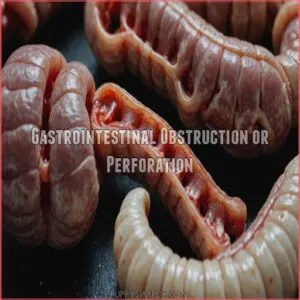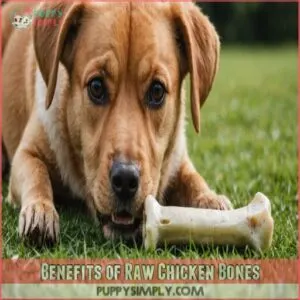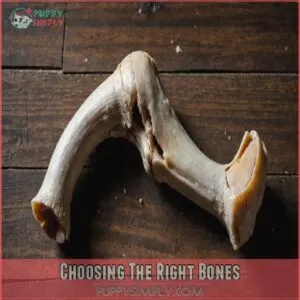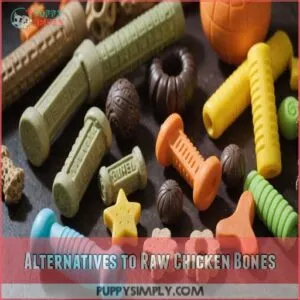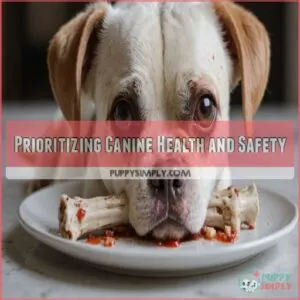This site is supported by our readers. We may earn a commission, at no cost to you, if you purchase through links.
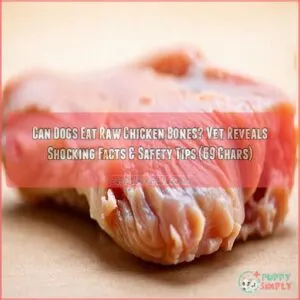 You might be surprised, but dogs can eat raw chicken bones—with some important caveats. Unlike cooked bones that splinter easily, raw bones are softer and more digestible. They’re nature’s toothbrush, helping to keep your pup’s pearly whites clean.
You might be surprised, but dogs can eat raw chicken bones—with some important caveats. Unlike cooked bones that splinter easily, raw bones are softer and more digestible. They’re nature’s toothbrush, helping to keep your pup’s pearly whites clean.
However, it’s not a free-for-all buffet. Moderation is key, and you’ll want to supervise your furry friend to prevent choking. Stick to smaller bones and avoid giving them to dogs with sensitive stomachs or those on special diets.
While raw chicken bones can offer nutritional benefits, they’re not without risks. Bacterial contamination is a concern, and some dogs may experience digestive upset. Curious about safer alternatives or how to minimize potential hazards?
Table Of Contents
- Key Takeaways
- Risks of Raw Chicken Bones
- Benefits of Raw Chicken Bones
- Safe Feeding Practices
- Alternatives to Raw Chicken Bones
- Prioritizing Canine Health and Safety
- Frequently Asked Questions (FAQs)
- Can dogs eat raw chicken bones?
- Can one eat chicken while on a diet?
- What if my dog eats a chicken bone?
- Can dogs eat raw chicken?
- Can dogs eat frozen chicken bones?
- Can dogs eat chicken bones without thawing?
- Are raw chicken bones ok for dogs?
- What do I do if my dog ate raw chicken bones?
- Is it okay to give dogs raw chicken drumsticks?
- Do raw chicken bones splinter?
- How often can I feed raw chicken bones?
- Are some dog breeds better suited for raw bones?
- Can puppies eat raw chicken bones safely?
- What signs indicate a dog is having trouble digesting bones?
- How do raw chicken bones compare to other raw meats?
- Conclusion
Key Takeaways
- Raw chicken bones are softer and more digestible than cooked bones, but you’ll need to weigh the benefits against risks like bacterial contamination and choking hazards.
- You should always supervise your dog when feeding raw bones, choose appropriately sized bones, and limit chewing sessions to 10-15 minutes.
- Consider safer alternatives like dental chews, freeze-dried meat treats, or commercial raw food diets if you’re uncomfortable with the risks of raw chicken bones.
- Consult your veterinarian before introducing raw chicken bones to your dog’s diet, as individual factors like breed, size, and health status will affect their suitability.
Risks of Raw Chicken Bones
While your dog might love gnawing on raw chicken bones, you’ll need to watch out for three major risks: harmful bacteria like Salmonella, potential choking hazards, and possible intestinal damage.
Even though raw bones are safer than cooked ones, they’re not risk-free, and you’ll want to weigh these dangers against any potential benefits before feeding them to your furry friend.
Bacterial Infections
Three nasty bacterial troublemakers – Salmonella, E. coli, and Campylobacter – can lurk in raw chicken bones, putting your furry friend at risk of food poisoning.
While freezing helps reduce bacterial contamination, it won’t eliminate all dangers.
You can learn more about these bacteria and how to minimize their risk by checking out this website that sells products related to chicken bone bacteria.
Your pup’s meat quality matters too – lower-grade chicken often carries higher bacterial loads.
Feeding your dog old or spoiled chicken can be extremely hazardous to their health, as it may contain pathogens that make dogs seriously ill, including bacteria like Salmonella or Clostridium perfringens found in expired chicken. Don’t worry though – we’ll show you how to minimize these risks in the safety tips ahead.
Choking Hazard
Have you ever watched your pup tackle a raw chicken bone with the enthusiasm of a tiny wolf?
While raw turkey necks can be a nutritious and healthy treat for dogs, providing them with essential nutrients like protein, glucosamine, and chondroitin for joint health benefits, raw bones dogs can enjoy safely, they’re not without risks.
You’ll need to match bone size to your dog breed – think bigger than their snout to prevent a choking hazard.
Always supervise feeding and watch for choking signs like pawing at the mouth, gagging, or distress.
Gastrointestinal Obstruction or Perforation
While choking risks are scary, raw chicken bones can also wreak havoc in your dog’s digestive system.
Cooking bones only increases the danger, as cooked bones can splinter and lead to potentially life-threatening intestinal blockages.
These sneaky culprits might get stuck or pierce delicate tissues, leading to a costly emergency vet visit.
Smaller breeds face higher risks, and surgery’s often the only fix for serious cases.
- Watch for vomiting, loss of appetite, or
- X-rays can spot bone fragments causing trouble
- Surgery costs typically run $2,000-5,000
- Different breeds handle bones differently – know your pup’s limits
Benefits of Raw Chicken Bones
You’ll be surprised to learn that raw chicken bones can actually benefit your dog’s dental health by naturally cleaning their teeth as they chew.
These uncooked bones also provide essential nutrients like calcium and phosphorus, while offering mental stimulation that keeps your furry friend happy and engaged.
Dental Benefits
Mother Nature’s toothbrush comes in the form of raw bones, offering your pup a natural way to maintain dental hygiene.
The mechanical action of raw bone chewing effectively scrapes away stubborn plaque and tartar buildup from your dog’s teeth.
For best results, consider adding chicken bone dog treats to your dog’s dental routine.
You’ll notice fresher breath and healthier gums as these natural dental chews work their magic.
It’s like giving your furry friend a daily teeth-cleaning workout.
Nutritional Value
Beyond keeping those pearly whites clean, raw chicken bones pack quite the nutritional punch for your pup.
You’ll find they’re loaded with protein content that’ll keep your dog’s muscles strong, plus calcium and phosphorus for healthy bones.
There’s even collagen for joint health and vitamin D for overall health.
Just remember, they’re supplements to a balanced diet, not meal replacements.
Digestive Benefits
Raw chicken bones pack a powerful punch for your dog’s digestive health.
They naturally stimulate enzyme production, making digestion smoother than a well-oiled machine.
Here’s what happens when your pup chomps on raw bones:
- Your dog’s gut flora gets a healthy boost
- Their stomach acid becomes stronger
- The bone fragments act like natural digestive cleaners
You’ll notice less tummy troubles and better poops!
Enrichment and Mental Stimulation
Like a natural puzzle toy, chicken bones provide your dog with mental enrichment that rivals expensive boredom busters.
You’ll notice your pup’s eyes light up as they work to extract every morsel, engaging their problem-solving skills.
However, it’s important to remember that chicken bone risks can be mitigated by choosing raw over cooked bones.
These natural chew toys create the perfect opportunity for foraging games, keeping your furry friend mentally stimulated while satisfying their natural urge to chew.
Safe Feeding Practices
If you’re thinking about feeding raw chicken bones to your dog, you’ll need to follow specific safety practices to protect your furry friend from potential risks.
You can make raw bones a safe treat by choosing the right size, properly freezing them, and always watching your pup while they enjoy their prehistoric-style snack.
Choosing The Right Bones
While raw chicken bones offer benefits, choosing the right ones is key to your pup’s safety.
Opt for larger bones that won’t fit entirely in your dog’s mouth.
Neck bones or wings from mature chickens are good picks.
Avoid small, brittle bones that could splinter.
Remember, the bone’s size should match your dog’s breed and chewing habits.
It’s like finding the perfect chew toy – safety first, fun second!
Freezing and Thawing
Freeze those raw chicken bones for at least three weeks to zap most nasty bacteria. It’s like giving germs the cold shoulder!
When it’s chow time, thaw only what Fido’ll eat in a day.
Keep unused bones on ice for up to six months.
Remember, freezing doesn’t make bones invincible, so always play it safe. Your pup’s health is worth the extra chill time!
Supervising Feeding
Now that you’ve got those frozen bones ready, let’s talk about keeping an eye on your pup.
You wouldn’t leave a toddler alone with a lollipop, right?
Same goes for your dog with raw chicken bones.
Stay close and watch for any signs of trouble.
If Fido’s gulping instead of chewing, step in.
Keep fresh water nearby and limit bone time to 10-15 minutes.
Your vigilance is key to preventing choking hazards and ensuring safe, enjoyable chew sessions.
Discarding Cooked Bones
Don’t let those cooked bones become a ticking time bomb for your pup!
Toss ’em in the trash ASAP, and make sure it’s out of Fido’s reach.
Cooked bones are brittle and can splinter, causing serious harm.
Got leftovers? Wrap them up tight and bin them securely.
When feeding your dog, even something as tempting as BBQ ribs dangers can pose a threat. Remember, it’s better to be safe than sorry regarding your furry friend’s health.
Stick to safe alternatives for peace of mind.
Alternatives to Raw Chicken Bones
You don’t have to risk your pup’s health with raw chicken bones when there are safer options available.
From dental chews to freeze-dried treats, you’ll find plenty of alternatives that’ll keep your furry friend happy and healthy.
Dental Chews
Looking for a safer alternative to raw chicken bones?
Dental chews are your go-to solution for keeping your pup’s pearly whites clean.
These specially designed treats come in various shapes and sizes, perfect for every dog.
They’re not just tasty – they help reduce plaque and tartar buildup, freshening breath along the way.
Offer them a few times a week, but remember, they’re no substitute for regular brushing.
Your dog’s dentist will thank you!
Freeze-Dried Meat Treats
While dental chews are great, freeze-dried meat treats offer another safe alternative to raw chicken bones.
You can find a variety of store-bought options, such as popular freeze-dried dog treats, to make shopping easier.
These treats pack a protein punch without the risks of bacterial contamination.
They’re lightweight, have a long shelf life, and retain most of their nutritional value.
You can even make DIY versions at home!
Just remember to keep portion sizes in check to keep your pup healthy and happy.
Commercial Raw Food Diets
Raw dog food for beginners can be challenging, but choosing the best raw dog food is crucial for a balanced diet. Commercial raw food diets offer a safer alternative to homemade raw meals.
These pre-packaged options take the guesswork out of balancing your dog’s nutrition.
Here’s what you need to know:
- Ingredients: Look for high-quality protein sources and added vitamins.
- Safety: Reputable brands follow strict safety protocols to minimize bacterial risks.
- Cost: While pricier than kibble, they’re often more cost-effective than preparing raw meals at home.
Remember, even with commercial diets, proper handling is key to keeping your furry friend healthy.
Safe Chew Toys
Several safe chew toys can satisfy your dog’s urge to gnaw without the risks of raw chicken bones.
Opt for durable rubber toys like Kongs, which you can stuff with treats for added excitement.
Nylon bones and dental chews offer long-lasting entertainment while promoting oral health.
Remember to choose the right size for your pup’s breed and chewing habits.
Always supervise playtime to make sure your furry friend’s safety.
Prioritizing Canine Health and Safety
Your dog’s health should be your top priority when considering raw chicken bones.
Consult your vet and monitor your pup’s diet closely to make sure they’re getting the balanced nutrition they need, adjusting as necessary to keep that tail wagging and your furry friend thriving.
Importance of a Balanced Diet
Balancing your dog’s diet is like crafting a perfect recipe.
You can’t just toss in raw chicken bones and call it a day.
Your furry friend needs a mix of proteins, carbs, fats, vitamins, and minerals.
Think of it as a doggy food pyramid.
Homemade dog food can be tricky, so consider reliable dog food brands that meet nutritional needs.
Don’t forget to watch for food allergies and supplement wisely.
Your pup’s health depends on it!
Consultation With a Veterinarian
Before you roll the dice on raw chicken bones, consult your vet.
They’re your go-to expert for specific advice on your pup’s dietary needs.
Your vet can assess your dog’s health, consider breed-specific factors, and address any food allergies.
They’ll help you weigh the risks and benefits, ensuring you’re not barking up the wrong tree with your furry friend’s diet.
Trust me, it’s better to be safe than sorry!
Monitoring Health and Adjusting Diet
Your vet’s advice is golden, but you’re the one who knows your furry friend best.
Keep a watchful eye on your pup’s health when introducing raw chicken bones.
You’ll want to monitor:
- Dog weight: Any sudden changes could signal trouble
- Stool consistency: Look for signs of digestive issues
- Allergies or food sensitivities: Watch for unusual reactions
If something seems off, don’t hesitate to adjust their diet.
Remember, your dog’s health is the top priority in this raw bone adventure!
Frequently Asked Questions (FAQs)
Can dogs eat raw chicken bones?
Like a wolf in the wild, dogs can eat raw chicken bones, but it’s essential to consider the benefits and risks, such as the potential for choking on raw chicken thigh bones, but it’s not without risks.
You’ll need to be cautious: choose human-grade meat, freeze it to kill bacteria, and supervise your pup while they chew.
Can one eat chicken while on a diet?
Chicken’s a dieter’s best friend.
It’s packed with lean protein, helping you feel full while keeping calories in check.
Grill it, bake it, or toss it in a salad – you’ve got a versatile, diet-friendly protein powerhouse.
What if my dog eats a chicken bone?
Careful canine caretakers, don’t panic!
Monitor your dog closely for signs of distress.
If it’s a raw bone, they’ll likely digest it.
For cooked bones, call your vet immediately.
Keep an eye out for choking, vomiting, or lethargy.
Can dogs eat raw chicken?
While dogs can eat raw chicken, including raw chicken legs benefits that provide protein and nutrients for joint health, it’s not without risks.
You’ll need to weigh the pros and cons carefully.
Raw chicken can provide nutritional benefits, but it also carries the risk of bacterial contamination.
Always consult your vet first.
Can dogs eat frozen chicken bones?
Frozen chicken bones can be safer for dogs than raw ones.
They’re less likely to splinter and can help clean teeth.
However, they still pose choking risks.
Always supervise your pup and consider safer alternatives recommended by your vet.
Can dogs eat chicken bones without thawing?
You can feed your dog frozen chicken bones, but it’s not ideal.
Thawing reduces choking risks and makes them easier to digest.
Always supervise and choose appropriate sizes.
Remember, safety is paramount when it comes to your furry friend’s treats!
Are raw chicken bones ok for dogs?
Raw chicken bones can be risky for dogs.
They’re less likely to splinter than cooked bones but still pose choking hazards.
If you’re considering them, freeze first to reduce bacteria.
Always supervise and consult your vet for safer alternatives.
What do I do if my dog ate raw chicken bones?
Like a tightrope walker, your pup’s in a delicate situation.
Stay calm and watch for signs of distress.
If you’re worried, call your vet pronto.
They’ll guide you through the next steps, ensuring your furry friend’s safety.
Is it okay to give dogs raw chicken drumsticks?
Feeding dogs raw chicken drumsticks isn’t risk-free.
While they’re less likely to splinter than cooked bones, they can harbor bacteria.
If you’re set on it, freeze the meat first and always supervise your pup’s chewing session.
Do raw chicken bones splinter?
Imagine a tree branch bending in the wind.
Unlike cooked bones, raw chicken bones don’t splinter easily.
They’re more flexible and digestible for dogs.
However, they’re not risk-free.
Always supervise and choose appropriate sizes to make sure your pup’s safety.
How often can I feed raw chicken bones?
You can offer raw chicken bones 1-2 times a week as treats.
They’re not a full meal replacement.
Always supervise your pup and remove any small pieces.
Remember, moderation’s key to keeping your furry friend safe and happy!
Are some dog breeds better suited for raw bones?
Larger breeds with strong jaws are better suited for raw bones.
However, all dogs need supervision.
Consider your dog’s size, chewing habits, and health.
Consult your vet before introducing raw bones to make sure it’s safe for your pup.
Can puppies eat raw chicken bones safely?
While adults can handle raw bones, puppies have delicate teeth and digestive systems.
You shouldn’t give your pup raw chicken bones.
They’re a choking hazard and can cause infections.
Stick to puppy-safe chew toys instead.
What signs indicate a dog is having trouble digesting bones?
Watch for vomiting, constipation, or bloody stools.
Your dog might seem lethargic, lose appetite, or show signs of abdominal pain.
If you notice these symptoms, it’s time to call the vet pronto.
How do raw chicken bones compare to other raw meats?
Like a buffet of bones, raw chicken offers a unique feast.
You’ll find it’s softer than beef or lamb, making it easier to chew.
It’s leaner too, packing a protein punch without the extra fat.
Conclusion
Ever heard the myth that raw chicken bones are deadly for dogs? It’s not entirely true.
While can dogs eat raw chicken bones safely in some cases, it’s not without risks. Bacterial infections, choking, and digestive issues are real concerns.
However, with proper precautions and veterinary guidance, raw bones can offer dental and nutritional benefits.
Remember, every dog is unique. What works for one mightn’t suit another. Always prioritize your pup’s health and safety when considering raw chicken bones or any dietary changes.



